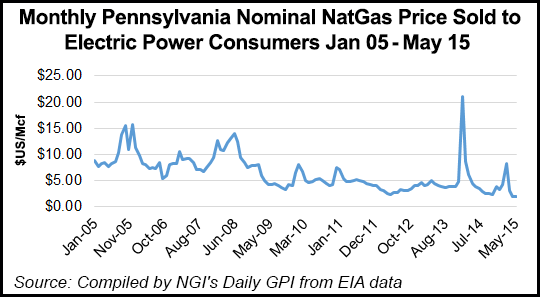Regulatory | NGI All News Access
Pennsylvania AG Reaches Another $2M-Plus Settlement With Electric Supplier
The Pennsylvania Attorney General’s Office has reached another settlement with a retail electric generation supplier to resolve consumer complaints that it deceptively marketed its variable electric rates during the brutally cold winter of 2013-2014.

The attorney general’s office said New York-based IDT Energy Inc. agreed to pay $2.4 million worth of refunds to eligible customers in addition to the more than $4 million it has already paid. IDT, a subsidiary of the publicly traded electricity and natural gas supplier Genie Energy Ltd., has operations in six states, including Pennsylvania. Under the settlement, the company would also pay a civil penalty of $25,000 and give $75,000 to the Electric Distribution Companies’ hardship fund.
Winter 2013-2014 was one of the nation’s coldest in decades. It sent demand for natural gas to record-setting heights and forced price spikes that left power generators scrambling for gas and found grid operators left to fill any voids and direct electricity as they could. The IDT settlement must be approved by the Pennsylvania Public Utility Commission.
Attorney General Kathleen Kane received hundreds of calls and complaints from consumers regarding “unexpected and dramatic spikes in the cost of their electricity,” her office said in 2014. Kane’s office filed legal action against five electric generation suppliers, including IDT, Respond Power, Hiko Energy, Pennsylvania Gas & Electric (PaG&E) and Blue Pilot Energy shortly after it received those complaints.
Two other settlements with Hiko and PaG&E are pending.
In March, the attorney general’s office said it had reached a settlement with PaG&E for $2.3 million in refunds in addition to the $4.5 million that the company — also known as Energy Services Providers Inc. — had already paid eligible consumers (see Daily GPI, March 27).
Both the IDT and the PaG&E settlements would impose a more than one-year moratorium on selling variable rates in the state. Variable rates allow consumer bills to change month to month based on fluctuations in the market. The companies would be required to offer fixed-rate plans for terms longer than six months.
© 2024 Natural Gas Intelligence. All rights reserved.
ISSN © 1532-1231 | ISSN © 2577-9877 |
